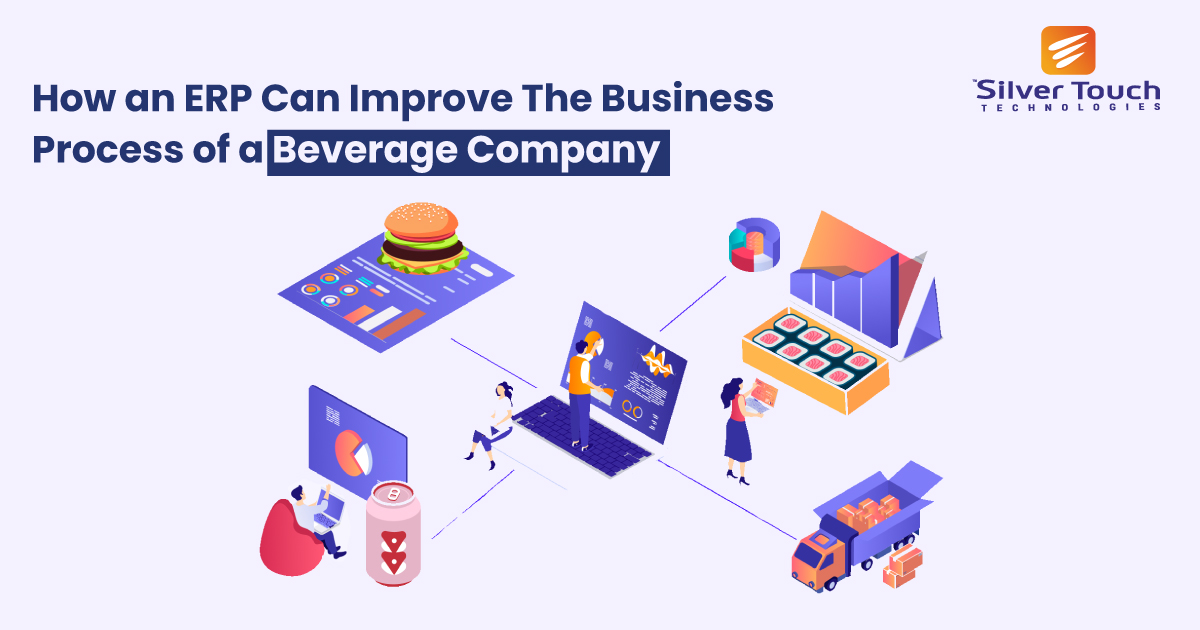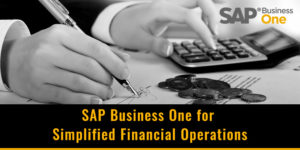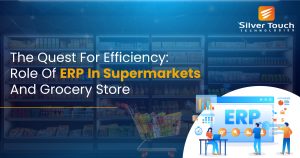The beverage industry is one of the consistently growing industries across the globe. In fact, in the United Kingdom, if turnover is seen as the benchmark, the food and beverage industry happens to be the biggest manufacturing sector. Yet, despite this awe-inspiring growth story, the fact that there are more than 11,600 food and beverage companies in the UK means that the competition in the industry is fierce. Existing and new players are in a perpetual battle to gain market share.
In this competitive environment, any beverage manufacturer must keep their internal business operations smooth and fast to save time and money and provide customers with unparalleled services. All this is possible with the help of any ERP software.
ERP software empowers beverage manufacturers to streamline their business operations, serve customers efficiently, and save time and money. Today, beverage manufacturers face many challenges – production-wise, sales-wise, and compliance-wise. ERP for beverage industries can significantly address most of these challenges.
In this article, we’ll talk about the challenges that the beverage industry faces while
Key Operational Areas Associated with the Beverage Industry
The beverage industry has multi-faceted and huge operational areas. It needs to combine sales, purchases as well as production together. Here are the primary operational areas that any beverage company has-
Production
Production is perhaps the most important part of the business operations of the beverage industry. The production department has to meet the demands of customers, and at the same time, it has to stay compliant with regulatory guidelines. Managing this dual responsibility manually can become overwhelming. On top of that, there is the constant requirement to come up with newer products to stay ahead of the competition.
Inventory
Beverage manufacturers, like manufacturers in every other industry, have the task of managing two kinds of inventory- raw materials inventory and finished goods inventory. These companies have to keep track of the raw materials inventory to avoid production delays. On the other hand, they have to keep enough stock to meet the demands of their products.
Tracking Expiry Dates
Keeping track of the expiry dates of the products is an important task that any manufacturer in the food and beverage has to do diligently. Beverage manufacturers take special care to assign expiry dates to products made in a batch. And then, they have to keep track of these batch products and enable warehouse rules like FEFO to make sure product-batches that are nearest to the expiry dates are released earlier than others.
Sales and Purchasing
Sales and purchase is an intrinsic part of any company. The beverage industry – big and small – works with different suppliers to purchase raw materials. Communicating with these suppliers, negotiating the prices of the raw materials, and ensuring the receipt of quality materials – all these are involved in purchasing. The purchasing department has to work closely with the production and warehouse departments to ensure that there are adequate raw materials present in the warehouses for production to go on smoothly.
The sales department, on the other hand, ensures the timely delivery of products to retailers and customers. The sales department, too, has to keep working in close contact with the finance department and the inventory department. On the one hand, the sales department has to diligently share the accounts receivable with the finance department, and on the other hand, it has to plan for the delivery of finished goods, specify the warehouse from where the beverages should be released, ensure no delay in the delivery of products and so on.
Marketing & Customer Satisfaction
Marketing is another intrinsically connected operational area – especially for the beverage industry, where competition is extremely high. Every mid-sized and large company depends on CRMs to log all its communication with customers, plan marketing activities, store and update customer info – and, in summary, provide a superior customer experience so that they not only stay as repeat customers but endorse its products as well.
Accounting
Accounting operations form the backbone of any company. The same is the case for beverage companies. Keeping track of expenses, revenues, cash flow, loss, and profit must be done in an organised and disciplined manner. The accounting department has to work doubly hard when it comes to any manufacturing company. Not only is the cost of raw materials needed to be taken into account, but the labour and equipment costs must also be taken into account in order to keep the accounting accurate.
Operational Challenges Faced by the Beverage Industry
A beverage manufacturing company has a multi-faceted operational posture with various departments managing specific aspects of the manufacturing. Sometimes, this business operation can become too complex and difficult to manage. Here are the most reported challenges that companies – both large and mid-sized, face.
Issues With Communication
Food and Beverage manufacturers have to communicate with the raw material suppliers on the one hand and retailers on the other. Without a standardised communication system, it becomes difficult for the manufacturer to keep track of the vital information exchanged among the stakeholders. However, it will not be fair if the beverage manufacturers expect the raw material suppliers and the retailers to use the same internal system as the manufacturers.
As a result of the usage of disparate systems, beverage manufacturers and their suppliers or customers use siloed information-sharing systems. These disparate systems don’t communicate with each other efficiently, which leads to an information bottleneck.
Adhering To Strict Regulatory Compliance
The beverage industry – like the food industry – has to make sure that it is following all the regulatory guidelines while manufacturing the products. After all, humans drink beverages, and there is a high chance of them falling ill if the beverage manufacturers fail to meet the regulatory guidelines. From keeping track of the batch expiry date to making sure all the ingredients are used in proper quantity – adhering to such compliance is a regular affair.
Multi-Channel Business Model
In this world, most businesses have a multi-channel business strategy. Offline stores don’t drive traffic much, but they help build the brand for beverage companies. Yet, with the rise of ecommerce sites, these companies sell their beverages to people who order online. Reconciling these two revenue sources can prove to be cumbersome and time-consuming.
The Pressure of Continuous Innovation
This is the era of health consciousness. More and more people are focusing on their health, so traditional carbonated and sugar water is gradually losing popularity. This changing trend is forcing beverage manufacturers to come up with new and improved products.
The Problem of Too Much Data Generation
Beverage manufacturing companies generate huge data as they work with their suppliers and customers. This data needs to be collected in a centralised way and analysed in a disciplined manner. However, due to silos in the data collection process, it becomes impossible for beverage manufacturing companies to leverage all of their data. Failing to analyse data involves the danger of remaining one step behind the curve and unaware of emerging trends.
Lack of Visibility
One unique problem faced by any manufacturing company is that it has to maintain two kinds of inventory – raw materials and finished goods. Keeping a balance between these two kinds of inventory is crucial in ensuring that there are enough raw materials available and that the raw materials do not stay redundant for long. Without a centralised view of the inventory, it becomes impossible to manage the warehouses efficiently.
How an ERP Can Help Beverage Manufacturers Address Their Pain Points
All the pain points that we discussed above can be addressed by quality ERP solutions like SAP Business One. At the end of the day, the root cause of these pain points is the fact that there is a lack of a centralised information system leading to an information bottleneck, which in turn, results in the failure of automating manual tasks.
First Things First, What Is an ERP?
Every business has some core business processes – sales, marketing, inventory handling, accounting etc. These core business processes entail day to day activities of the business. Much of the success of a business depends on how deftly a company can handle its core business processes. These business processes depend on the smooth transport of business data and information from one department to another. An ERP facilitates this transfer of data to automate the core business processes. For example, when a beverage company sells a batch of products to a retailer, it expects to receive a certain amount of money from the retailer in the near future. The ERP automatically saves this data in the form of pending/open accounts receivables. Once the retailer pays the company, a simple click of a button updates the entire system and fills all the necessary financial details in the general ledger.
How Does an ERP System Work?
An ERP system works by facilitating the smooth movement of business information so that there is no information bottleneck. The system becomes the single source of truth for all the departments. It also acts as a bridge between the departments across the company. The end result is the creation of a truly connected business process with little to no manual data entry, a 100% digital work process, automation, and smart analysis of enterprise data.
Here’s how an ERP solves all these problems-
Improved Communication With Suppliers and Retailers Catering to the Beverage Industry
A quality ERP system offers custom solutions to companies so that their internal system can connect to other external systems of their suppliers and retailers. This ensures the preservation of a solid communication channel between the beverage company and external stakeholders. In fact, ERPs like SAP Business One can help beverage companies create custom data entry solutions for small suppliers who do not have their own internal systems.
An ERP System Makes Adhering to Regulatory Compliance Easier
Most ERP systems have two important modules – Bill of Materials and Material Resource Planning (MRP). The Bill of Materials enables the beverage manufacturer to add details like how much of a particular raw material is needed to produce a certain beverage, the production method, the time that should be taken etc. These details can be standardised, benchmarked and templatised to mass produce a certain beverage without deviating from the benchmarked process.
Easy Expiry Date Management of Beverage Products
Keeping track of the expiry dates of batch products is an important criterion for staying compliant with regulatory guidelines. Most manufacturing ERPs for the beverage industry offer batch management which empowers the companies to keep track of the expiry dates of the beverages.
Tremendous Support For Multi-Channel Business Model
Gone are the days when businesses having multi-channel business models had to reconcile sales data manually. With a quality ERP for beverage industries, beverage companies can now see the sales and purchase data in a single platform. ERPs like SAP S/4 HANA enables businesses to connect their system with ecommerce platforms and also with the external systems of offline retailers. This ensures a wholesome ingestion of data into a single source of truth.
Analysing Big Data and Forecasting Trends Become Easier With an ERP
Companies use ERP not just to organise data in a disciplined manner. Today ERPs act like data analytics platforms as well. With all the historical data available in a centralised manner, it becomes easy for a smart ERP system like SAP Business One to analyse it and forecast future trends. Forecasting future trends is extremely important in today’s world, where people are ditching carbonated and sugar-based beverages in favour of healthy drinks. Forecasting what people want can give leverage to forward-thinking beverage manufacturers.
No matter how much a beverage company produces, the ERP system can analyse all of it gracefully. This makes sure that beverage companies do not remain oblivious to emerging trends or their business performance.
Easy Inventory Management
An ERP connects the purchasing department with the production department. These two departments can see the data of each other. Hence, there is complete visibility of both the wants and needs – in terms of raw materials and finished goods. The purchasing department remains aware of the raw materials inventory levels, enabling it to purchase raw materials as and when needed.
In fact, most ERP systems allow the creation of alerts when the raw material level drops below a certain threshold. Similarly, the production department remains aware of the purchase orders and inventory levels and produces a certain beverage based on the requirement. Often, these two departments work alongside each other. So when the production department – while creating a Bill of Materials and MRP sees that a certain raw material is not there in sufficient quantity, it can order that material then and there.
You may also like: SAP Inventory Management Software – A Detailed Guide
An ERP Automates the Backend of the Manufacturing Process
Manufacturing a beverage is not just physical work. Many data entry tasks, planning and proactive monitoring, are associated with the process. These tasks are mainly manual in nature and can be automated. The ERP system for the beverage industry does exactly that – in more ways than one.
- Every reputed ERP system has Bill of Materials and Material Resource Planning modules. These two modules not only automate the backend of the production process but also make sure that everything needed for unhindered production is available to the company.
- The Bill of Materials(BoM) is a nice way to standardise the materials, process and labour needed to produce a certain quantity of a particular beverage. Once created, the BoM can be reused to produce the same beverage. This eliminates the manual work needed to measure each raw material and specify the process every time production is initiated.
The BoM is further leveraged by Material Resource Planning. It becomes tedious to manually check whether you have all the necessary resources available in the inventory to produce a certain beverage. The Material Resource Planning module takes the data from the BoM and automatically checks if all the items are available in the inventory. In fact, the MRP takes production schedules into account as well to further make sure that all necessary resources are available beforehand and the finished product can be delivered on time. The beverage industry has to ensure strict quality control because its products are drunk by consumers. Any quality issue can have a severe impact in terms of customer health, and even lawsuits can be filed against the beverage company.
Most ERP systems automate this QC aspect – again with the help of the Bill of Materials module. Any deviation from the planned usage of materials can lead to setting off an alert. This automated quality check can further be expanded with custom-made add-ons provided by ERP partners like Silver Touch Technologies.
Key Benefits That a Beverage Manufacturer Gets Out of an ERP System
So, to summarise, here are the key benefits that a beverage manufacturer can get out of an ERP for the beverage industry-
An ERP system can help a beverage manufacturer perform the dual task of managing the raw materials inventory and the finished goods inventory. It enables the two forms of inventories to complement each other.
An ERP for the beverage industry further helps manufacturers in keeping track of the expiry dates of their batch of products.
Such a system would ensure a smooth flow of information among various departments. Beverage companies can avoid manual data entry errors, automate business processes and prevent misunderstandings from cropping up among the departments.
A good ERP system for the beverage industry combines offline and online sales nicely to give the beverage manufacturers a single window to manage both kinds of channels – offline and online.
Every system that can be called an ERP ties up the entire process with the thread of accounting. An ERP connects all the major departments to the accounting department, ensuring unparalleled visibility into the financial posture of the company.
Finally, modern ERP systems empower beverage manufacturers to analyse their enterprise data and come up with insightful analyses. This enables the companies to remain prepared for the changes to come in the future.
How to Choose the Right ERP System for Your Food & Beverage Business
Now that you know how an ERP addresses the pain points of the beverage industry, the question arises – can you implement any and every ERP that comes your way? Of course not. An ERP system must be chosen extremely carefully and after thorough planning. The success of your business processes is baked into the ERP system once you implement it. This is why care must be taken to choose the right ERP for your business. Here’s how you can do that-
ERP systems come in all sizes. While choosing an ERP, you need to keep the size of your beverage company in mind. Opting for a too-complex ERP with many bells and whistles can lead to unnecessary complexities and produce more bottlenecks.
In continuation with the first point, you must also make sure that the ERP you opt for your beverage business is scalable. A company can’t afford to change the ERP system every once in a while – both financially and technically. This is why it is necessary for a business to think long-term and choose an ERP that can be scaled up as and when the business grows.
Always ensure that most of the features of the ERP that your beverage company needs are there in the ERP system out of the box – without the need to add any integration.
From the manufacturing perspective, your beverage company needs to opt for an ERP that supports all the manufacturing processes involved in your company. At the same time, you need to make sure that the potential ERP system for your choice handles other core processes (like sales or purchases) in your company as well.
This is the age of cloud ERPs. We would recommend keeping your ERP implementation costs low by opting for a cloud-based ERP for beverage companies.
Lastly, in order to avoid implementing a separate data analytics platform, opt for an ERP that can analyse your enterprise data from the same system.
Want to Ensure a Successful ERP Implementation? Contact SilverTouch Technologies
According to Statista, there are more than 2,700 beverage companies competing against each other in the U.K. In the United States, too, there are more than 2,500 beverage companies.
From these figures, you can imagine the enormous competition these companies face. Keeping an efficient, agile business process can empower businesses to RESPOND to changing business atmospheres and evolving competition instead of REACTING to them. ERP for beverage industries enables companies to stay light, act efficiently and move swiftly. On top of that, with data analytics capabilities baked into modern ERP systems, beverage companies gain unparalleled insight into their businesses, which enables them to remain ever-prepared for the changes to come in the future.
There’s one catch, though. The gift of ERP can only be fully enjoyed by beverage manufacturers if the ERP system is implemented correctly and successfully. Gartner data shows that around 55% to 75% of ERP implementation fails globally. So, if you want to stay agile in this competitive business atmosphere, your first task is to implement the ERP software successfully. This is where SilverTouch Technologies comes in.
A Track Record of 100% Successful ERP Implementations
With a track record of 100% successful ERP implementation, we give you the confidence to leap towards a brave new world of digital transformation. Contact us today to protect your beverage business from the competition and changing business landscape.
Conclusion About ERP for Beverage Industry
Choosing an ERP is quite a big decision. The future of your beverage company depends largely on how organised your business process is. In this hyper-competitive world where customers demand more and more benefits and services from companies, an ERP system can help such companies stay lean and pass on the money saved to the customers in the form of benefits, discounts and offers. Contact SilverTouch Technologies and welcome a new and exciting world of managing your core business 100% digitally.





